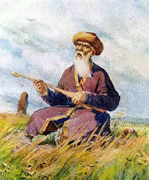
CATEGORIES:
BiologyChemistryConstructionCultureEcologyEconomyElectronicsFinanceGeographyHistoryInformaticsLawMathematicsMechanicsMedicineOtherPedagogyPhilosophyPhysicsPolicyPsychologySociologySportTourism
FOOD FOR RELIGIOUS AND HOLIDAY CELEBRATIONS.
Because the early nomads heavily depended on livestock for survival, animals were at the core of ancient Kazakh religion. Traditional beliefs held that separate spirits inhabited animals. Honored guests were sometimes asked to bless an animal and ask its spirit for permission to taste its  flesh.
flesh.
Most Kazakhs of the twenty-first century are Sunni Muslims. The Islam religion did not become widely practiced until the late 1700s. This is because the nomads of that time settled in rural areas, and the Muslims worshiped in mosques that were in the cities. Muslims in Kazakhstan celebrate the Festival of Fast-Breaking (known as Id al-Fitr or Eid al-Fitr elsewhere), which is the day ending Ramadan. Ramadan is a month-long fast, where Muslims cannot eat or drink from sunrise to sunset. During the Festival of Fast-Breaking, Kazakh Muslims visit each other and hand out deep-fried dough twists and other fried doughnuts, such as baursaki, as a form of celebration.
Ø Collect the unknown words of all your teammates and yours. Fill this table with the information:
| Word | I think it means…… | I investigated it means….. |
Ø Answer the questions:
1. Why is meat the most popular national foodstuff in Kazakhstan?
2. What kind of lifestyle did Kazakh people have in the past?
3. Do Kazakh people eat only their national food? Why?
4. How are guests treated in Kazakhstan?
5. What food do Kazakh people have for celebrations?
6. Do you know similar dishes cooked by peoples living in your country? Name them to your teammates.
Ø Discussion:
1. What kind of Kazakh food do you enjoy?
2. Do you think Kazakh food is healthy? Why or why not?
3. What food from your culture is found in the Kazakh diet?
Ø Project work:
Make a project “My favourite food”.
Kazakh Traditional Dishes
The main traditional dish of kazakhs is besbarmak. It is mostly served for the guests and eaten by hands (bes barmak- means five fingers). Besbarmak is usually cooked of fat mutton and parts of smoked horse meat and horse delicacies like kazy and shyzhyk. The meat is boiled and separately is boiled thin paste. Boiled parts of meat are put on the paste and spiced with a special flavoring called tuzdyk. As the custom demands the host serves the meal in special crockery- tabak. The bastabak, which is placed before the most honourable guests is used to serve the mutton head, zhambas, horse meat delicacy and other fatty parts.The esteemed guest (usually the oldest one) cuts bits and parts from the head and offers them to the other guests at the table. The secret of distribution of parts of the meat from the head lies in traditional wishes. When given the plate, it expresses the wish – “be wise and eloquent “, the larynx – a gift to sing, skin of forehead – “be the first among equals “. Meanwhile one or-two dzhigits (young man), sitting next to the esteemed quest start cutting the boiled parts of meat to pieces and the dish is again spiced with tuzdyk. The quests are offered to help themselves to the dish.
Ø Put the sentences in the correct order:
- The meat is boiled and separately is boiled thin paste.
- The esteemed guest (usually the oldest one) cuts bits and parts from the head and offers them to the other guests at the table.
- The main traditional dish of the Kazakhs is besbarmak.
- Besbarmak is usually cooked of fat mutton and parts of smoked horse meat and horse delicacies like Kasy and shyzhyk.
- The guests are offered to help themselves to the dish.
- The secret of distribution of parts of the meat from the head lies in traditional wishes.
Ø Choose the right word:
1. The main traditional dish of Kazakhs is …
a) bauyrsak
b) kuyrdak
c) besbarmak
2. Besbarmak is eaten with …
a) hands
b) four fingers
c) five fingers
3. The meat is …
a) fried
b) boiled
c) cooked
4. The bastabak is plased before the most …
a) respectful guests
b) constant guests
c) honorable guests
5. Mean while one or two, sitting next to the esteemed guest, start culting the boiled parts of meat to pieces and the dish is again spiced with tuzdyk.
a) women
b) girls
c) young men
Ø Match the words:
1. traditional a. meat
2. smoked b. guests
3. boiled c. dish
4. special d. horse
5. honourable e. parts
6. fatty f. to pieces
7. cut g. flavouring
PART XV: LEGENDS THE KAZAKH LEGEND OF THE LAME ONAGER (KOULAN)

 Once the son of the Great Golden Horde khan Zhoshy (Dzhoushie) was hunting the wild onagers. Zhoshy was so much interested in the process of hunting and arrow shooting that he didn’t notice when he had left his suite behind him. The prince hit the aims just to the point and there was no mercy towards the poor animals. The leader of the wild onager herd was very brave and strong. The lame onager was his name. He wasn’t afraid of the wolves. He got his name because of his battle with the beasts. The beasts had injured the onager’s leg. So, the onager suddenly turned back and attacked the prince. The attack of the lame leader was so impudent and fierce that Zhoshy fell off the horse, broke his neck and died. The herd of the onagers became free from the chase and ran away into the steppe. The onagers’ leader was at the head as before.
Once the son of the Great Golden Horde khan Zhoshy (Dzhoushie) was hunting the wild onagers. Zhoshy was so much interested in the process of hunting and arrow shooting that he didn’t notice when he had left his suite behind him. The prince hit the aims just to the point and there was no mercy towards the poor animals. The leader of the wild onager herd was very brave and strong. The lame onager was his name. He wasn’t afraid of the wolves. He got his name because of his battle with the beasts. The beasts had injured the onager’s leg. So, the onager suddenly turned back and attacked the prince. The attack of the lame leader was so impudent and fierce that Zhoshy fell off the horse, broke his neck and died. The herd of the onagers became free from the chase and ran away into the steppe. The onagers’ leader was at the head as before.
Nobody of the suite dared to tell the Great Golden Horde khan about his son’s death as there was an awful custom to execute the one who used to bring bad news. There lived an aged man Ketbouk who was very wise. People called him Ouly Zhirshy because he was the famous singer’s son. So, Ouly Zhorshy is the native name for “the famous singer’s son”. Thus, that aged man Ketbouk by name carved a dombra (Kazakh stringed folk instrument) out of a birch tree and drew the strings. Then he came to the Great Khan’s palace and kneeled in front of the throne. The master felt that the guest came to his palace because of the bad reason. So, the khan asked him gloomily what the great singer wanted. Without saying a word the singer began to play his birch dombra. The melody was very sad. It was called (and is still called) kyui. That kyui was telling about the young prince’s hunt and his meeting the onager herd grazing in the spring steppe. The onagers’ leader had been lucky and had managed to lead the herd away the chase a lot of times. But not that very time. The danger was very serious. The prince’s arrows caught up the mares and the issue. Soon the killing bow arrows stroke the herd and the horsemen were nearly to seize the animals. To escape the danger the lame onager at the cost of his life turned back and attacked the chasing prince. The prince was thrown down to the ground. That was the death of the young khan’s son. The singer stopped playing the dombra. Although he pronounced no word the Great Khan as well as all the rest understood everything. So sad did the dombra play! The instrument sang about the clatter of the onagers’ hoofs, about onagers’ anxiety for their foals, about the strength and wisdom of the lame onager that tried to save his herd. The dombra was particularly sorrowful while singing about the lame onager’s attack against the prince. The khan kept silent for a long time. His suite didn’t dare to utter a word. At last the Great Khan said “You told me the bad news without pronouncing a word. Then let the dombra be punished but not you. Fill it up with lead!”
 Thus, owing to the wise man Ketbouk the Great Golden Khan was informed about his son’s death despite the terrible custom. Since then the flat side of the dombra has had an opening (a hole) as the sign of its guilt for the bad news about the prince’s death.
Thus, owing to the wise man Ketbouk the Great Golden Khan was informed about his son’s death despite the terrible custom. Since then the flat side of the dombra has had an opening (a hole) as the sign of its guilt for the bad news about the prince’s death.

Ø Read the story. Order these sentences and retell the story:
a. Thus, the Great Golden Khan was informed about his son’s death despite the terrible custom.
b. Without saying a word the singer began to play his birch dombra.
c. The onager suddenly turned back and attacked the prince.
d. The herd of the onagers became free from the chase and ran away into the steppe.
e. Although he pronounced no word the Great Khan as well as all the rest understood everything.
f. Zhoshy fell off the horse, broke his neck and died.
g. He didn’t notice when he had left his suite behind him.
h. Nobody of the suite dared to tell the Great Golden Horde khan about his son’s death.
i. There lived an aged man Ketbouk who was very wise.
j. Then he came to the Great Khan’s palace and kneeled in front of the throne.
k. Once the son of the Great Golden Horde khan Zhoshy was hunting the wild onagers.
(Keys: 1k, 2g, 3c, 4f, 5d, 6h, 7i, 8j, 9b,10,e, 11a)
Ø Make up your own sentences with them.
Ø Try to explain the following words by means of English:
an onager
a horseman
a dombra
the issue
Ouly Zhirshy
Ø Answer the question:
Why did people call the aged man Ouly Zhirshy?

Date: 2015-01-12; view: 1637
| <== previous page | | | next page ==> |
| MEALTIME CUSTOMS. | | | ALDAR KOSE AND THE SNAKE |